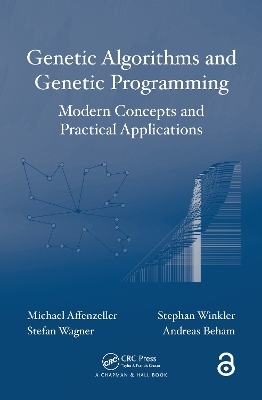
Genetic Algorithms and Genetic Programming
Modern Concepts and Practical Applications
Seiten
2009
Chapman & Hall/CRC (Verlag)
978-1-58488-629-7 (ISBN)
Chapman & Hall/CRC (Verlag)
978-1-58488-629-7 (ISBN)
Describes several generic algorithmic concepts that can be used in various kinds of GA or with evolutionary optimization techniques. This title provides a better understanding of the basic workflow of GAs and GP, encouraging readers to establish new bionic, problem-independent theoretical concepts.
Genetic Algorithms and Genetic Programming: Modern Concepts and Practical Applications discusses algorithmic developments in the context of genetic algorithms (GAs) and genetic programming (GP). It applies the algorithms to significant combinatorial optimization problems and describes structure identification using HeuristicLab as a platform for algorithm development.
The book focuses on both theoretical and empirical aspects. The theoretical sections explore the important and characteristic properties of the basic GA as well as main characteristics of the selected algorithmic extensions developed by the authors. In the empirical parts of the text, the authors apply GAs to two combinatorial optimization problems: the traveling salesman and capacitated vehicle routing problems. To highlight the properties of the algorithmic measures in the field of GP, they analyze GP-based nonlinear structure identification applied to time series and classification problems.
Written by core members of the HeuristicLab team, this book provides a better understanding of the basic workflow of GAs and GP, encouraging readers to establish new bionic, problem-independent theoretical concepts. By comparing the results of standard GA and GP implementation with several algorithmic extensions, it also shows how to substantially increase achievable solution quality.
Genetic Algorithms and Genetic Programming: Modern Concepts and Practical Applications discusses algorithmic developments in the context of genetic algorithms (GAs) and genetic programming (GP). It applies the algorithms to significant combinatorial optimization problems and describes structure identification using HeuristicLab as a platform for algorithm development.
The book focuses on both theoretical and empirical aspects. The theoretical sections explore the important and characteristic properties of the basic GA as well as main characteristics of the selected algorithmic extensions developed by the authors. In the empirical parts of the text, the authors apply GAs to two combinatorial optimization problems: the traveling salesman and capacitated vehicle routing problems. To highlight the properties of the algorithmic measures in the field of GP, they analyze GP-based nonlinear structure identification applied to time series and classification problems.
Written by core members of the HeuristicLab team, this book provides a better understanding of the basic workflow of GAs and GP, encouraging readers to establish new bionic, problem-independent theoretical concepts. By comparing the results of standard GA and GP implementation with several algorithmic extensions, it also shows how to substantially increase achievable solution quality.
Michael Affenzeller, Stefan Wagner, Stephan Winkler, Andreas Beham
Introduction. Simulating Evolution: Basics about Genetic Algorithms. Evolving Programs: Genetic Programming. Problems and Success Factors. Preservation of Relevant Building Blocks. SASEGASA—More Than the Sum of All Parts. Analysis of Population Dynamics. Characteristics of Offspring Selection and the RAPGA. Combinatorial Optimization: Route Planning. Evolutionary System Identification. Applications of Genetic Algorithms: Combinatorial Optimization. Data-Based Modeling with Genetic Programming. Conclusion and Outlook. Symbols and Abbreviations. References. Index.
| Erscheint lt. Verlag | 15.4.2009 |
|---|---|
| Reihe/Serie | Numerical Insights |
| Zusatzinfo | 68 Tables, black and white; 138 Illustrations, black and white |
| Sprache | englisch |
| Maße | 156 x 234 mm |
| Gewicht | 680 g |
| Themenwelt | Informatik ► Theorie / Studium ► Künstliche Intelligenz / Robotik |
| ISBN-10 | 1-58488-629-3 / 1584886293 |
| ISBN-13 | 978-1-58488-629-7 / 9781584886297 |
| Zustand | Neuware |
| Haben Sie eine Frage zum Produkt? |
Mehr entdecken
aus dem Bereich
aus dem Bereich
Buch | Softcover (2024)
REDLINE (Verlag)
CHF 27,95
Eine kurze Geschichte der Informationsnetzwerke von der Steinzeit bis …
Buch | Hardcover (2024)
Penguin (Verlag)
CHF 39,20


